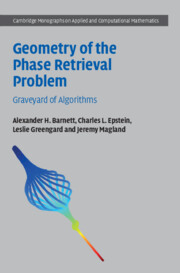1 - Introduction
Published online by Cambridge University Press: 21 April 2022
Summary
The Introduction defines the classical, phase retrieval problem, i.e., the use of auxiliary information to recover the unmeasured phase of the Fourier transform from samples of its magnitude, and the discrete, classical, phase retrieval problem, which is the model that is studied in this book. It reviews well-known facts about the phase retrieval problem, including the Hayes' uniqueness theorem, and the idea of trivial associates. Hayes' theorem states that the phase retrieval problem generically has a unique solution, up to trivial associates. It summarizes the main results in the book, including the description of the tangent and normal bundles of a magnitude torus, the various types of auxiliary data commonly employed in phase retrieval (the support constraint, the nonnegativity constraint), the problem of ill conditioning, and defines the standard algorithms used to address the phase retrieval problem in practical applications. It establishes notational conventions used throughout the text, and the approach taken to numerical experiments. It closes with appendices on the factorization of polynomials in more than one variable, and the concept of conditioning.
- Type
- Chapter
- Information
- Geometry of the Phase Retrieval ProblemGraveyard of Algorithms, pp. 1 - 36Publisher: Cambridge University PressPrint publication year: 2022

